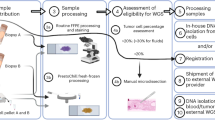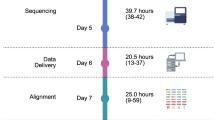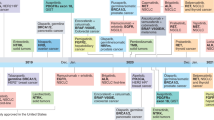Abstract
Advances in molecular diagnostics have enabled the identification of targetable driver pathogenic variants, forming the basis of precision oncology care. However, the adoption of new technologies, such as next-generation sequencing (NGS) panels, can exacerbate healthcare disparities. Here, we summarize data on use patterns of advanced biomarker testing, highlight the disparities in both accessing NGS testing and using this data to match patients to appropriate personalized therapies and propose multidisciplinary strategies to address inequities looking forward.
This is a preview of subscription content, access via your institution
Access options
Access Nature and 54 other Nature Portfolio journals
Get Nature+, our best-value online-access subscription
$29.99 / 30 days
cancel any time
Subscribe to this journal
Receive 12 digital issues and online access to articles
$119.00 per year
only $9.92 per issue
Buy this article
- Purchase on Springer Link
- Instant access to full article PDF
Prices may be subject to local taxes which are calculated during checkout


Similar content being viewed by others
References
Park, J. J. H., Hsu, G., Siden, E. G., Thorlund, K. & Mills, E. J. An overview of precision oncology basket and umbrella trials for clinicians. CA Cancer J. Clin. 70, 125–137 (2020).
Schwartzberg, L., Kim, E. S., Liu, D. & Schrag, D. Precision oncology: who, how, what, when, and when not. Am. Soc. Clin. Oncol. Educ. Book 37, 160–169 (2017).
Kumar-Sinha, C. & Chinnaiyan, A. M. Precision oncology in the age of integrative genomics. Nat. Biotechnol. 36, 46–60 (2018).
Jørgensen, J. T. The current landscape of the FDA approved companion diagnostics. Transl. Oncol. 14, 101063 (2021).
Malone, E. R., Oliva, M., Sabatini, P. J. B., Stockley, T. L. & Siu, L. L. Molecular profiling for precision cancer therapies. Genome Med. 12, 8 (2020).
Chakravarty, D. et al. OncoKB: a precision oncology knowledge base. JCO Precis. Oncol. 2017, PO.17.00011 (2017).
Personalized Medicine Coalition. Personalized Medicine at the FDA: the Scope and Significance of Progress in 2021 https://www.personalizedmedicinecoalition.org/Userfiles/PMC-Corporate/file/Personalized_Medicine_at_FDA_The_Scope_Significance_of_Progress_in_2021.pdf (2021).
Martin, N. A. et al. Adopting consensus terms for testing in precision medicine. JCO Precis. Oncol 5, 1563–1567 (2021).
Howlader, N. et al. The effect of advances in lung-cancer treatment on population mortality. N. Engl. J. Med. 383, 640–649 (2020).
Siegel, R. L., Miller, K. D. & Jemal, A. Cancer statistics, 2020. CA Cancer J. Clin. 70, 7–30 (2020).
Qian, A. S. et al. Disparities in telemedicine during COVID-19. Cancer Med. 11, 1192–1201 (2022).
Leapman, M. S. et al. Mediators of racial disparity in the use of prostate magnetic resonance imaging among patients with prostate cancer. JAMA Oncol. 8, 687–696 (2022).
Brown, N. A. & Elenitoba-Johnson, K. S. J. Enabling precision oncology through precision diagnostics. Annu. Rev. Pathol. 15, 97–121 (2020).
Cheng, D. T. et al. Memorial Sloan Kettering—Integrated Mutation Profiling of Actionable Cancer Targets (MSK-IMPACT): a hybridization capture-based next-generation sequencing clinical assay for solid tumor molecular oncology. J. Mol. Diagn. 17, 251–264 (2015).
Landy, R. et al. Using prediction models to reduce persistent racial and ethnic disparities in the draft 2020 USPSTF lung cancer screening guidelines. J. Natl Cancer Inst. 113, 1590–1594 (2021).
Rauscher, G. H., Allgood, K. L., Whitman, S. & Conant, E. Disparities in screening mammography services by race/ethnicity and health insurance. J. Womens Health 21, 154–160 (2012).
Pinsky, P. F., Lau, Y. K. & Doubeni, C. A. Potential disparities by sex and race or ethnicity in lung cancer screening eligibility rates. Chest 160, 341–350 (2021).
Wolfson, J. A., Sun, C. L., Wyatt, L. P., Hurria, A. & Bhatia, S. Impact of care at comprehensive cancer centers on outcome: results from a population-based study. Cancer 121, 3885–3893 (2015).
Sultan, D. H., Gishe, J., Hanciles, A., Comins, M. M. & Norris, C. M. Minority use of a National Cancer Institute-designated comprehensive cancer center and non-specialty hospitals in two Florida regions. J. Racial Ethn. Health Disparities 2, 373–384 (2015).
Palazzo, L. L., Sheehan, D. F., Tramontano, A. C. & Kong, C. Y. Disparities and trends in genetic testing and erlotinib treatment among metastatic non-small cell lung cancer patients. Cancer Epidemiol. Biomarkers Prev. 28, 926–934 (2019).
Kirkwood, M. K. et al. The state of oncology practice in America, 2018: results of the ASCO Practice Census survey. J. Oncol. Pract. 14, e412–e420 (2018).
Burke, L. G. et al. Association of academic medical center presence with clinical outcomes at neighboring community hospitals among Medicare beneficiaries. JAMA Netw. Open 6, e2254559 (2023).
Mileham, K. F. et al. Defining comprehensive biomarker-related testing and treatment practices for advanced non-small-cell lung cancer: results of a survey of U.S. oncologists. Cancer Med. 11, 530–538 (2022).
Robert, N. J. et al. Biomarker tissue journey among patients (pts) with untreated metastatic non-small cell lung cancer (mNSCLC) in the U.S. Oncology Network community practices. J. Clin. Oncol. 39, 9004 (2021).
Trosman, J. R. et al. Biomarker testing in non-small cell lung cancer (NSCLC): an assessment of current practices in precision oncology in the community setting—a trial of the ECOG-ACRIN Cancer Research Group (EAQ161CD). J. Clin. Oncol. 39, e18649 (2021).
Boehmer, L. et al. Identifying barriers to equitable biomarker testing in underserved patients with NSCLC: a mixed-methods study to inform quality improvement opportunities. J. Clin. Oncol. 39, 123 (2021).
Larson, K. L. et al. EGFR testing and erlotinib use in non-small cell lung cancer patients in Kentucky. PLoS ONE 15, e0237790 (2020).
Lynch, J. A. et al. Underutilization and disparities in access to EGFR testing among Medicare patients with lung cancer from 2010–2013. BMC Cancer 18, 306 (2018).
Pezzi, T. A. et al. Association of Medicaid insurance with survival among patients with small cell lung cancer. JAMA Netw. Open 3, e203277 (2020).
Presley, C. J. et al. Disparities in next generation sequencing in a population-based community cohort of patients with advanced non-small cell lung cancer. J. Clin. Oncol. 35, 6563 (2017).
Enewold, L. & Thomas, A. Real-world patterns of EGFR testing and treatment with erlotinib for non-small cell lung cancer in the United States. PLoS ONE 11, e0156728 (2016).
Williams, D. R. Race, socioeconomic status, and health. The added effects of racism and discrimination. Ann. NY Acad. Sci. 896, 173–188 (1999).
Churchwell, K. et al. Call to action: structural racism as a fundamental driver of health disparities: a presidential advisory from the American Heart Association. Circulation 142, e454–e468 (2020).
Levy, D. E. et al. Underutilization of BRCA1/2 testing to guide breast cancer treatment: Black and Hispanic women particularly at risk. Genet. Med. 13, 349–355 (2011).
Chapman-Davis, E. et al. Racial and ethnic disparities in genetic testing at a hereditary breast and ovarian cancer center. J. Gen. Intern. Med. 36, 35–42 (2021).
Armstrong, K., Micco, E., Carney, A., Stopfer, J. & Putt, M. Racial differences in the use of BRCA1/2 testing among women with a family history of breast or ovarian cancer. JAMA 293, 1729–1736 (2005).
Meyer, L. A. et al. Evaluating women with ovarian cancer for BRCA1 and BRCA2 mutations: missed opportunities. Obstet. Gynecol. 115, 945–952 (2010).
Shields, A. E., Burke, W. & Levy, D. E. Differential use of available genetic tests among primary care physicians in the United States: results of a national survey. Genet. Med. 10, 404–414 (2008).
Bruno, D. S., Hess, L. M., Li, X., Su, E. W. & Patel, M. Disparities in biomarker testing and clinical trial enrollment among patients with lung, breast, or colorectal cancers in the United States. JCO Precis. Oncol. 6, e2100427 (2022).
Kehl, K. L., Lathan, C. S., Johnson, B. E. & Schrag, D. Race, poverty, and initial implementation of precision medicine for lung cancer. J. Natl Cancer Inst. 111, 431–434 (2019).
Sheinson, D. M. et al. Trends in use of next-generation sequencing in patients with solid tumors by race and ethnicity after implementation of the Medicare national coverage determination. JAMA Netw. Open 4, e2138219 (2021).
Bruno, D. S. et al. Racial disparities in biomarker testing and clinical trial enrollment in non-small cell lung cancer (NSCLC). J. Clin. Oncol. 39, 9005 (2021).
Aldrighetti, C. M., Niemierko, A., Van Allen, E., Willers, H. & Kamran, S. C. Racial and ethnic disparities among participants in precision oncology clinical studies. JAMA Netw. Open 4, e2133205 (2021).
Gierman, H. J. et al. Genomic testing and treatment landscape in patients with advanced non-small cell lung cancer (aNSCLC) using real-world data from community oncology practices. J. Clin. Oncol. 37, 1585 (2019).
Quinn, R., Patel, R., Sison, C., Singh, A. & Zhu, X. H. Impact of precision medicine on clinical outcomes: a single-institution retrospective study. Front. Oncol. 11, 659113 (2021).
Nadler, E. et al. Treatment patterns and clinical outcomes in patients with advanced non-small cell lung cancer initiating first-line treatment in the US community oncology setting: a real-world retrospective observational study. J. Cancer Res. Clin. Oncol. 147, 671–690 (2021).
Sturgill, E. G. et al. Next-generation sequencing of patients with breast cancer in community oncology clinics. JCO Precis. Oncol. 5, 1297–1311 (2021).
Doshi, J. A., Li, P., Huo, H., Pettit, A. R. & Armstrong, K. A. Association of patient out-of-pocket costs with prescription abandonment and delay in fills of novel oral anticancer agents. J. Clin. Oncol. 36, 476–482 (2018).
Kato, S. et al. Real-world data from a molecular tumor board demonstrates improved outcomes with a precision N-of-One strategy. Nat. Commun. 11, 4965 (2020).
Freedman, A., Klabunde, C. & Wiant, K. Use of next-generation sequencing tests to guide cancer treatment: results from a nationally representative survey of oncologists in the United States. JCO Precis. Oncol. 2, PO.18.00169 (2018).
Gray, S. W., Hicks-Courant, K., Cronin, A., Rollins, B. J. & Weeks, J. C. Physicians’ attitudes about multiplex tumor genomic testing. J. Clin. Oncol. 32, 1317–1323 (2014).
Kuderer, N. M. et al. Comparison of 2 commercially available next-generation sequencing platforms in oncology. JAMA Oncol. 3, 996–998 (2017).
Levit, L. A. et al. Implementing precision medicine in community-based oncology programs: three models. J. Oncol. Pract. 15, 325–329 (2019).
Zeng, J. et al. Operationalization of next-generation sequencing and decision support for precision oncology. JCO Clin. Cancer Inform. 3, 1–12 (2019).
De Paoli-Iseppi, R. et al. Comparison of whole-exome sequencing of matched fresh and formalin fixed paraffin embedded melanoma tumours: implications for clinical decision making. Pathology 48, 261–266 (2016).
Shi, Y. et al. A prospective, molecular epidemiology study of EGFR mutations in Asian patients with advanced non-small-cell lung cancer of adenocarcinoma histology (PIONEER). J. Thorac. Oncol. 9, 154–162 (2014).
Spratt, D. E. et al. Racial/ethnic disparities in genomic sequencing. JAMA Oncol. 2, 1070–1074 (2016).
Nassar, A. H. et al. Ancestry-driven recalibration of tumor mutational burden and disparate clinical outcomes in response to immune checkpoint inhibitors. Cancer Cell 40, 1161–1172 (2022).
Martin, A. R. et al. Clinical use of current polygenic risk scores may exacerbate health disparities. Nat. Genet. 51, 584–591 (2019).
Kim, M. S. et al. Testing the generalizability of ancestry-specific polygenic risk scores to predict prostate cancer in sub-Saharan Africa. Genome Biol. 23, 194 (2022).
Rebbeck, T. R. et al. Mutational spectrum in a worldwide study of 29,700 families with BRCA1 or BRCA2 mutations. Hum. Mutat. 39, 593–620 (2018).
Manrai, A. K. et al. Genetic misdiagnoses and the potential for health disparities. N. Engl. J. Med. 375, 655–665 (2016).
Lau-Min, K. S., Guerra, C. E., Nathanson, K. L. & Bekelman, J. E. From race-based to precision oncology: leveraging behavioral economics and the electronic health record to advance health equity in cancer care. JCO Precis. Oncol. 5, 403–407 (2021).
Tate, J. G. et al. COSMIC: the Catalogue of Somatic Mutations in Cancer. Nucleic Acids Res. 47, D941–D947 (2019).
Sheinson, D. M., Wong, W. B., Flores, C., Ogale, S. & Gross, C. P. Association between Medicare’s national coverage determination and utilization of next-generation sequencing. JCO Oncol. Pract. 17, e1774–e1784 (2021).
LUNGevity Foundation. LUNGevity State Scorecard: State Medicaid Coverage Policy and Impact on Lung Cancer Outcomes; https://www.lungevity.org/public-policy/lung-cancer-scorecard (2020).
Flowers, M. E. et al. Public Act 102-0203; https://www.senatorholmes.com/legislation/my-legislation (2021).
Kesselheim, A. S., Avorn, J. & Sarpatwari, A. The high cost of prescription drugs in the United States: origins and prospects for reform. JAMA 316, 858–871 (2016).
Essien, U. R., Dusetzina, S. B. & Gellad, W. F. A policy prescription for reducing health disparities—achieving pharmacoequity. JAMA 326, 1793–1794 (2021).
Hunter, A., Wright, P., Cappelli, M., Kasaboski, A. & Surh, L. Physician knowledge and attitudes towards molecular genetic (DNA) testing of their patients. Clin. Genet. 53, 447–455 (1998).
Myers, R. E. et al. A survey of physician receptivity to molecular diagnostic testing and readiness to act on results for early-stage colon cancer patients. BMC Cancer 16, 766 (2016).
Association of Community Cancer Centers. Precision Medicine: Transforming Complex to Clear https://www.accc-cancer.org/home/learn/precision-medicine (2022).
Bosompra, K. et al. Likelihood of undergoing genetic testing for cancer risk: a population-based study. Prev. Med. 30, 155–166 (2000).
Armstrong, K. et al. Factors associated with decisions about clinical BRCA1/2 testing. Cancer Epidemiol. Biomarkers Prev. 9, 1251–1254 (2000).
Gray, S. W. et al. Attitudes of patients with cancer about personalized medicine and somatic genetic testing. J. Oncol. Pract. 8, 329–335 (2012).
Bussey-Jones, J. et al. Asking the right questions: views on genetic variation research among Black and white research participants. J. Gen. Intern. Med. 24, 299–304 (2009).
Shirdarreh, M., Aziza, O., Pezo, R. C., Jerzak, K. J. & Warner, E. Patients’ and oncologists’ knowledge and expectations regarding tumor multigene next-generation sequencing: a narrative review. Oncologist 26, e1359–e1371 (2021).
Tzeng, J. P. et al. Women’s experiences with genomic testing for breast cancer recurrence risk. Cancer 116, 1992–2000 (2010).
Bradbury, A. R. Implementation of precision cancer medicine: progress and the path to realizing the promise of tumor sequencing. J. Oncol. Pract. 15, 297–299 (2019).
Bradbury, A. R. et al. A randomized study of genetic education versus usual care in tumor profiling for advanced cancer in the ECOG-ACRIN Cancer Research Group (EAQ152). Cancer 128, 1381–1391 (2022).
Pishvaian, M. J. et al. Overall survival in patients with pancreatic cancer receiving matched therapies following molecular profiling: a retrospective analysis of the Know Your Tumor registry trial. Lancet Oncol. 21, 508–518 (2020).
Johnson, A. et al. The right drugs at the right time for the right patient: the MD Anderson precision oncology decision support platform. Drug Discov. Today 20, 1433–1438 (2015).
Akkari, Y., Smith, T., Westfall, J. & Lupo, S. Implementation of cancer next-generation sequencing testing in a community hospital. Cold Spring Harb. Mol. Case Stud. 5, a003707 (2019).
Rebbeck, T. R. et al. A framework for promoting diversity, equity, and inclusion in genetics and genomics research. JAMA Health Forum 3, e220603 (2022).
Arora, K. et al. Genetic ancestry correlates with somatic differences in a real-world clinical cancer sequencing cohort. Cancer Discov. 12, 2552–2565 (2022).
Haddad, T. et al. Impact of a cognitive computing clinical trial matching system in an ambulatory oncology practice. J. Clin. Oncol. 36, 6550 (2018).
Mazor, T. et al. MatchMiner: computational matching of cancer patients to precision medicine clinical trials. Eur. J. Cancer 138, S18 (2020).
Mazor, T. et al. Abstract A024: MatchMiner: an open-source computational platform for genomically-driven matching of cancer patients to precision medicine clinical trials. Mol. Cancer Ther. 18, A024 (2019).
How Advances in Precision Oncology Are Shaping a New Diagnostic and Treatment Frontier https://www.ajmc.com/view/how-advances-in-precision-oncology-new-diagnostic-and-treatment-frontier (2020).
Tanaka, I., Furukawa, T. & Morise, M. The current issues and future perspective of artificial intelligence for developing new treatment strategy in non-small cell lung cancer: harmonization of molecular cancer biology and artificial intelligence. Cancer Cell Int. 21, 454 (2021).
Acknowledgements
T.R.R. received support for this work from the Dana-Farber–Harvard Cancer Center Cancer Center Support Grant (P30-CA006516) and the Zhu Family Center for Global Cancer Prevention.
Author information
Authors and Affiliations
Corresponding authors
Ethics declarations
Competing interests
R.D. has received consulting fees from Acuta Capital Partners. Q.M. has received research funding from Bayer. A family member of T.R.R. is a consultant to AstraZeneca. All other authors declare no competing interests.
Peer review
Peer review information
Nature Cancer thanks Nicolas Robine, Loren Saulsberry and Zsofia Stadler for their contribution to the peer review of this work.
Additional information
Publisher’s note Springer Nature remains neutral with regard to jurisdictional claims in published maps and institutional affiliations.
Rights and permissions
Springer Nature or its licensor (e.g. a society or other partner) holds exclusive rights to this article under a publishing agreement with the author(s) or other rightsholder(s); author self-archiving of the accepted manuscript version of this article is solely governed by the terms of such publishing agreement and applicable law.
About this article
Cite this article
Dutta, R., Vallurupalli, M., McVeigh, Q. et al. Understanding inequities in precision oncology diagnostics. Nat Cancer 4, 787–794 (2023). https://doi.org/10.1038/s43018-023-00568-1
Received:
Accepted:
Published:
Issue Date:
DOI: https://doi.org/10.1038/s43018-023-00568-1



